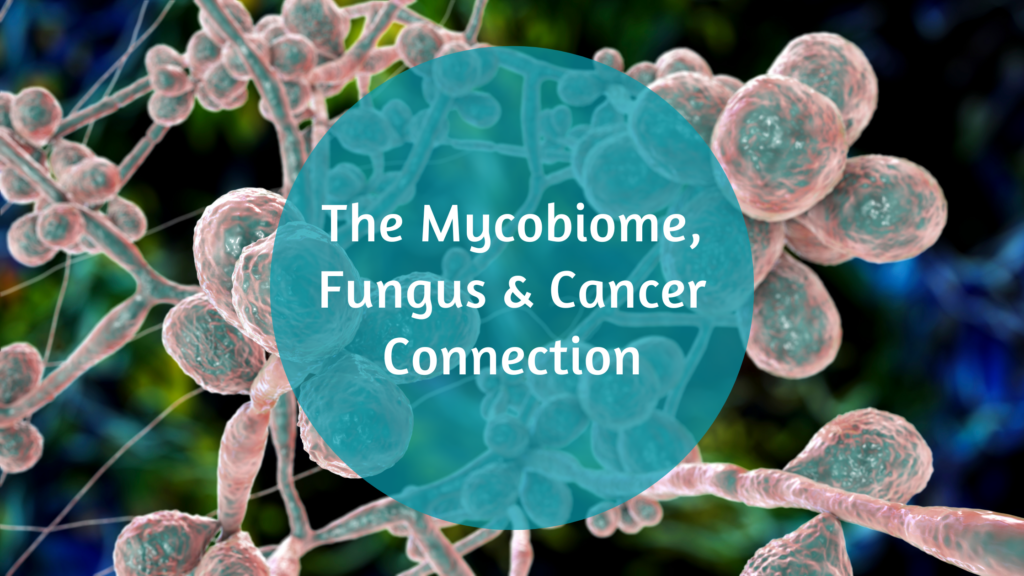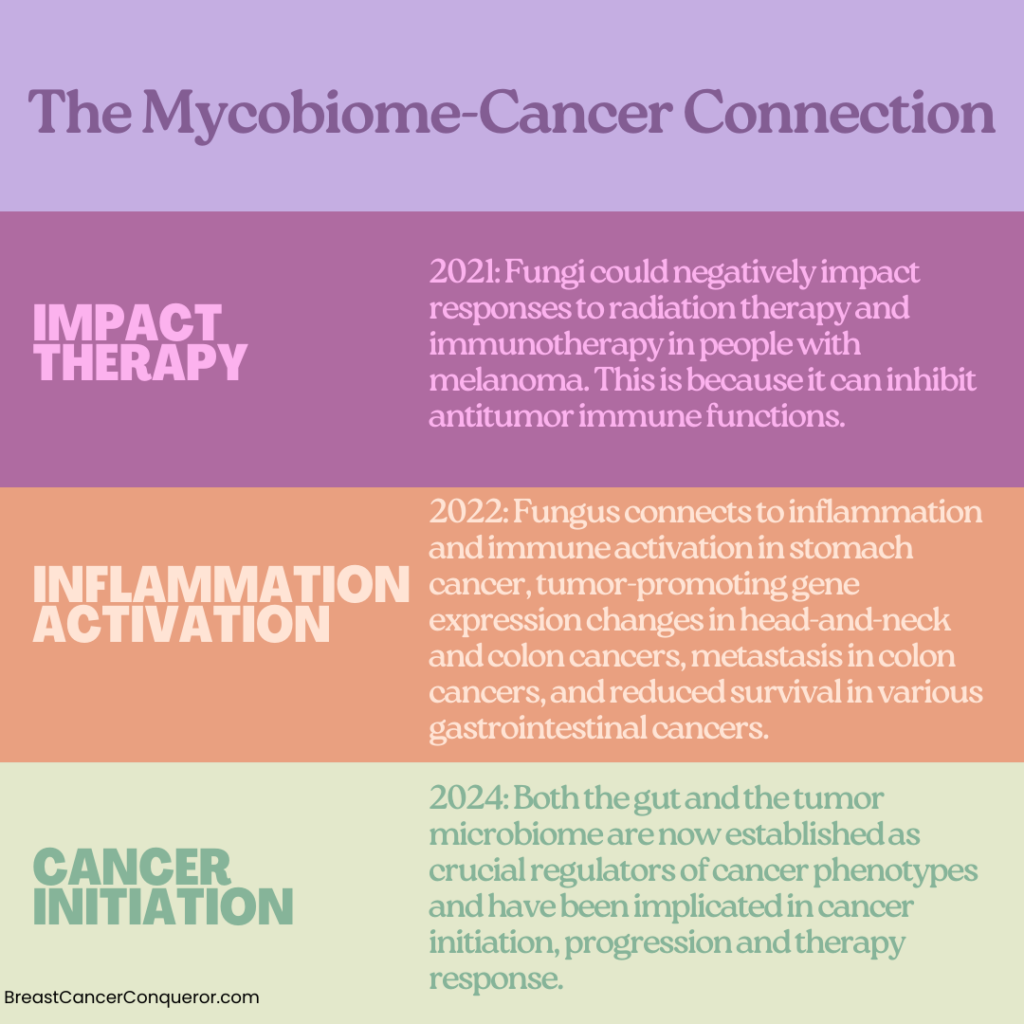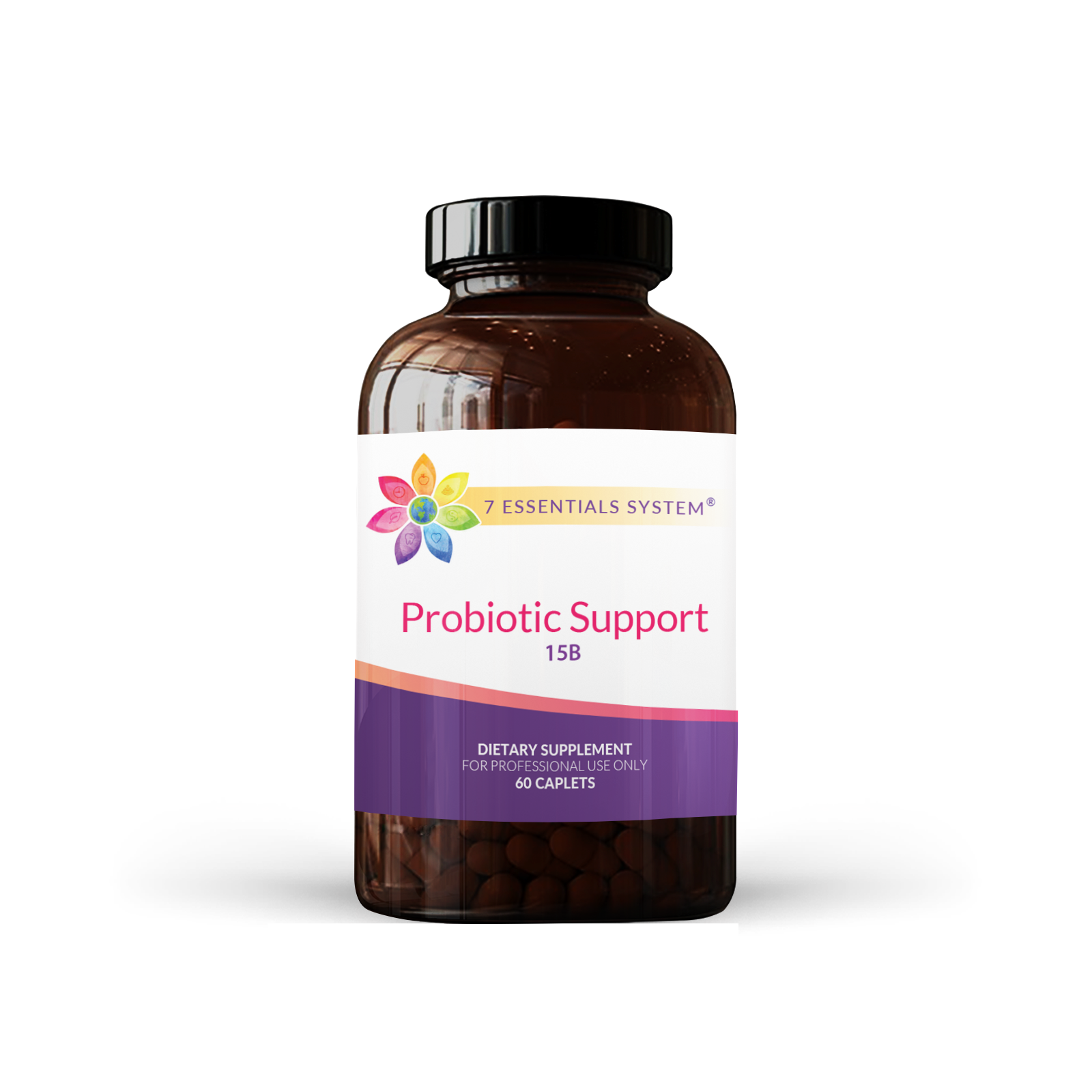

The mycobiome cancer connection is game-changing research that is happening as I type this blog post. While this research is still emerging, it provides invaluable insight that may be instrumental in your healing journey. My goal for you is to have access to the leading research so that you can make the most educated decisions about your healing journey. This is why I spend so much time writing blogs, creating recipes, recording podcasts, and building online programs with the brightest minds in the world.
This blog expands on the quotes below from The Fungal Mycobiome: A New Hallmark of Cancer Revealed by pan-cancer Analyses, one of the latest studies researching the mycobiome–cancer connection.
“Supporting the notion that the microbiome, including the mycobiome, is a key part of cancer biology. The findings also unveil the co-existence and close associations between fungi and bacteria. This should spur further attention to study their synergistic roles in tumors…Once researchers gain a more comprehensive picture of how fungi function in cancer, they may be able to develop antimicrobial therapies or targeted pre-or probiotic therapies that benefit patients with cancer.” Please review the complete study here.
Now, let’s break it down.

Microbiome vs. Mycobiome
First, I want to ensure you know the difference between microbiome and mycobiome since they have similar spellings.
Microbiome
The gut microbiome is the trillions of microbes in your gastrointestinal (GI) tract. It includes everything from bacteria, fungi, viruses, and parasites—and it expands past your gut. Your skin, vaginal flora, mouth, respiratory tract, and breasts are a few other places that have their microbiomes. Healthy microbiomes can ensure that humans and organisms benefit and live harmoniously.
Please review the blogs, podcasts, and supplements listed in the library at the end of this blog post to learn more about how your microbiome relates to your journey to vibrant health.
Mycobiome
The mycobiome (other names: mycobiota and fungal microbiome) is the fungal community in an organism. It is an important component of the human microbiome, yet it is grossly under-studied. “By interfacing with other biomes, as well as with the host, the mycobiome probably contributes to the progression of fungus-associated diseases and plays an important role in health and disease.”
“It could work in concert with bacteria, cellular proteins, and immune cells to influence cancer progression and patient prognosis.” Please learn more about your mycobiome via Genome Medicine research.
The Short Evolution of the Mycobiome Cancer Connection
This extremely brief timeline is only meant to give you a surface-level look into the emerging mycobiome cancer connection research. I really mean “emerging,” as the first study was published in 2019.
- 2019: The first evidence of fungi coexisting with cancer was reported in pancreatic cancer. The study suggested that cancer-associated fungi might impact the onset and progression of this cancer type. (2019 Study)
- 2021: Further research indicated that some fungi could negatively impact responses to radiation therapy and immunotherapy in people with melanoma. This is because it can inhibit antitumor immune functions. These findings spotlight the idea of modulating the mycobiome to improve responses to cancer treatments. (2021 Study)
- 2022: This study found in a subset of pancreatic cancers, “…fungi promoted the secretion of an immune-suppressing protein called IL-33, potentially enabling these cancers to circumvent the antitumor effects of the immune response and progress to more advanced stages. Interestingly, the expression of IL-33 was increased by a mutated form of the KRAS protein, thus revealing a tumor-promoting collaboration between this common mutant and the mycobiome in pancreatic cancer.” (February 2022 Study)
- 2022: The fungus, Candida, is associated with “inflammation and immune activation in stomach cancer, tumor-promoting gene expression changes in head-and-neck and colon cancers, metastasis in colon cancers, and reduced survival in various gastrointestinal cancers.” This study also discovered that interactions between fungi and surrounding bacterial communities correlated with outcomes. (September 2022 Study)
The most recent study was only published a few months ago:
- 2024: “Both the gut and the tumor microbiome are now established as crucial regulators of cancer phenotypes and have been implicated in cancer initiation, progression, and therapy response. Although the role of bacteria in these processes is beginning to be unraveled, the relevance of fungi is only just emerging.” As this study was published less than a few months ago, we really are on the cusp of this groundbreaking way of viewing and treating cancer.
While the roots of the mycobiome cancer connection tree are just starting to grow, there is a lot we do know now that can help your healing blossom. Please always feel free to reach out with specific questions and carefully review my library list below.
The Breast Cancer Conqueror Healthy Microbiome Library
Blogs:
- Go With Your Gut Feeling: Gut Health
- Emerging Research: Your Breast Microbiome and Breast Cancer
- Gut Health, Parasites & The Cancer Connection
Podcasts:
 Gut/Health Connection with Summer Bock
Gut/Health Connection with Summer Bock- Beyond Just Treating the Symptoms with Dr. Jenn Simmons
Supplements:
As Tony Robbins famously stated, “Knowledge is NOT power. Knowledge is only POTENTIAL power. Action is power.” Today is your day to turn knowledge into incredibly powerful decisions about your healing journey! I believe in YOU.
Author: Dr. Veronique Desaulniers, better known as Dr. V, is a Doctor of Chiropractic & has 44 years of experience in the wellness industry. For personalized support, please partner with a trained Breast Cancer Conqueror Coach.
